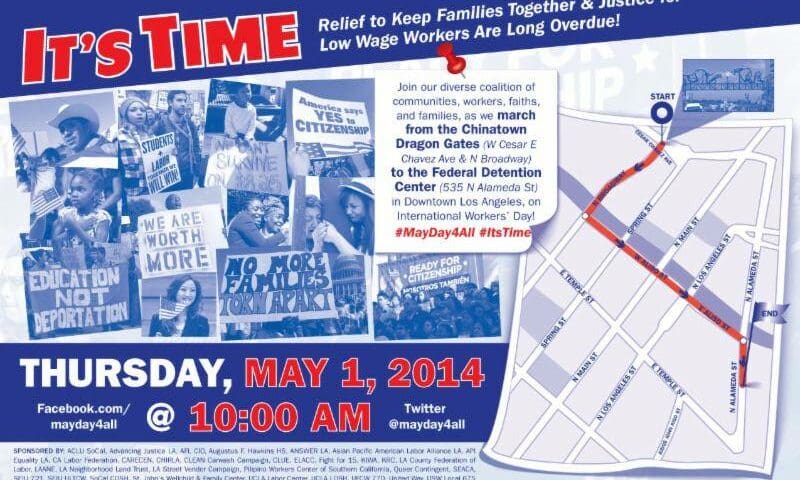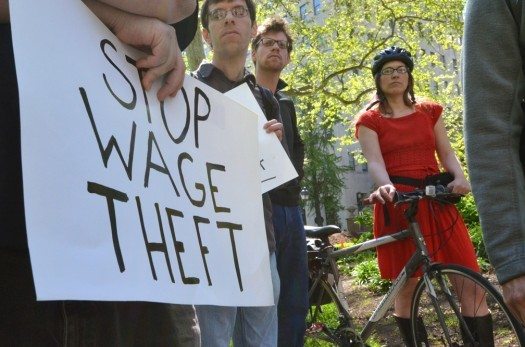


My mother went to high school in the early 1950s with Donald Sterling — known in those days by his given name, Donald Tokowitz — but doesn’t remember a thing about him. This could be because Tokowitz was one among hundreds of students at Roosevelt High, but perhaps it was an early metaphor for the future real estate tycoon being a generational anomaly.
By the time she got to Roosevelt, my mom — like Sterling, a child of Jewish immigrants — was steeped in the leftist politics of L.A.’s legendary Eastside neighborhood, Boyle Heights. With sizable numbers of Jews, Latinos, African Americans and Japanese, Boyle Heights was a working class ethnic melting pot in an era when all minorities were subject to varying degrees of the prevailing discrimination targeting anyone who wasn’t white and Christian.
It was also a hotbed of liberal and radical social movements, and the staging ground for some of L.A.’s most effective progressive organizing.


If you’ve had a hankering to visit downtown L.A. to sample artisanal sushi or to nail down a sale on that special luxury loft, Thursday, May 1, might not be the best day. If, however, you’re in the mood to demand that Congress pass immigration reform, or to call for the raising of the minimum wage or to honor the 5,000 American workers who died on the job last year, definitely drop by. The action begins 10 a.m. at Chinatown’s Dragon Gateway (Cesar Chavez Ave. and Broadway) and will move to the Federal Detention Center at 535 N. Alameda St., where marchers will demand the release of undocumented Americans.
Bring plenty of water, a hat or parasol, and any chant that begins, “Two, four, six, eight –” Brought to you by the Los Angeles County Federation of Labor.



As a college sophomore in the late ’80s, I didn’t have the benefit of Wikipedia or the Google. Instead, the holy grail of research was a black and yellow study guide called CliffsNotes. These heaven-sent summaries of major literary works were a lot easier to read than the originals.
During one quarter, I took a philosophy class where I was assigned to write an essay on Plato’s The Republic. It was springtime in the Bay Area, so the last thing I wanted to do was write the essay. After a visit to the campus bookstore, I devised a strategy to quickly complete my assignment: Summarize the CliffsNotes, and then tack on some class lecture notes. I thought my plan was foolproof — until the professor returned my essay a couple of weeks later. In bright red, he marked comments up and down the margins and in between paragraphs,
» Read more about: Railcar Investment & Jobs: A Teachable Moment »



The 48-hour strike by harbor truck drivers ended at dawn today. The haulers have returned to work after drawing an unprecedented amount of public attention to their cause – and without facing dismissals or other forms of retaliation from the three companies they targeted. Those firms — Pacific 9 Transportation, Total Transportation Services, Inc. and Green Fleet Systems – stood accused by the drivers of misclassifying them as “independent contractors,” even as a growing body of labor court rulings shows that the truckers are company employees. As such, they should be entitled to overtime wages, workers compensation, disability and an array of other benefits.
By being placed in the limbo of contractor status, however, the drivers are responsible for all their trucks’ upkeep, fuel and insurance. As a result, like the vast majority of American truckers, port drivers in Los Angeles and Long Beach must subsist on poverty wages.
Some of the drivers joined the work stoppage,
» Read more about: Port Truckers End Strike, Return to Work Without Retaliation »



The gaudy evidence of income inequality is all around us: stratospheric CEO “wages,” private plane shuttles to Coachella, gated enclaves and all the rest. But few things say “class war” more eloquently than wage theft, the practice by unscrupulous businesses of short-changing their employees by undercounting work hours or shaving off time for breaks that were never taken.
Wage theft is probably about a minute older than ancient history’s first labor handshake and partly exists because most workers who suffer it are too financially insecure to complain. Now, however, there is increasing pushback from some city and state governments, and from workers themselves –McDonald’s low-wage employees have filed class action lawsuits in several states to recover wages they allege were gouged from their paychecks.
In California, Assembly Bill 2416 (“California Wage Theft Prevention Act”), introduced by Mark Stone (D-Monterey Bay), seeks to curb wage theft by allowing workers to file liens against the real and business property of employers they claim owe them wages.
» Read more about: Lien In: New California Bill Seeks to Curb Wage Theft »



Port truck drivers today continued a 48-hour strike to press their demand to be treated as employees of trucking companies rather than as independent contractors. The distinction is crucial to thousands of drivers who service the nation’s largest port complex, including the more than 100 strikers who drive short hauls for Pacific 9 Transportation, Total Transportation Services, Inc. and Green Fleet Systems. Currently misclassified by the companies as private contractors, these drivers, like the majority of U.S. port truck drivers, are denied overtime wages, workers compensation, disability and a host of other benefits, and must pay for the fuel and maintenance of their vehicles. Furthermore, after paycheck deductions many drivers earn poverty wages despite working long hours during six-day weeks.
At a noontime media event held in Wilmington Waterfront Park, TTSI driver Dennis Martinez told a crowd that “We had to strike because they didn’t want to listen. They didn’t want to deal with us.”



Photographer Vivian Maier spent her last months on a park bench overlooking Lake Michigan, her secret life boxed up in storage units around Chicago. Her tens of thousands of negatives, 16mm films and voice recordings (not to mention newspaper clippings, receipts, unopened IRS refunds, blouses and hats) could easily have disappeared into obscurity if it weren’t for a young real estate agent and amateur local historian, John Maloof, who has a penchant for auctions and flea markets.
If you enjoy photography and the unpredictability of human existence you’ll enjoy Maloof’s film, Finding Vivian Maier. The documentary describes an eclectic journey to unearth the life and motivations of an eccentric subject, an artist who never sought to have her pictures displayed or published.
Maier seemed to have trouble making close human connections, but with her camera she was uncanny in creating intimacy with the widely diverse life on the streets of Chicago and New York.


 Are zero-dollar pay stubs and sub-minimum wages really what keep the restaurant industry afloat? That’s what one powerful lobbying group would have us believe.
Are zero-dollar pay stubs and sub-minimum wages really what keep the restaurant industry afloat? That’s what one powerful lobbying group would have us believe.
Taylor Lee can tell you the real impact of minimum wages for tipped workers. Taylor is a 23-year-old restaurant server working in Berkeley, California. Like two-thirds of tipped workers, she is a woman. In California, the minimum wage is currently $8 per hour, whether you get tips or not. This is the amount that Taylor’s employer pays her, “but with tips, if it’s really slow, I make $12 per hour,” she says. “My average wage is about $18-20 per hour.”
From 2006 to 2013, Taylor worked as a server at restaurants in Florida. The minimum wage in Florida is $7.93, but the minimum wage for tipped workers is $4.91. She worked at a Japanese restaurant as a server. If she didn’t get enough tips to make it to $7.93 per hour,



The years-long fight of Los Angeles Port truck drivers to be recognized as company employees– instead of “independent contractors” who lack workplace rights and protections – burst into a 48-hour strike this morning. The work stoppage by drivers for four major trucking firms is organized by Justice for Port Drivers and is targeting the marine container terminals at the twin ports of Los Angeles and Long Beach.
Despite winning a string of labor court rulings in wage theft lawsuits, the drivers say they are still misclassified as independent contractors. That misclassification has meant that drivers are denied overtime wages, workers compensation, disability and a host of other benefits, and must pay for the fuel and maintenance of their vehicles. It has also guaranteed that after paycheck deductions, many drivers who work long hours during six-day weeks earn poverty wages.
This is the second strike in six months by drivers,


In an excruciating example of bad timing, the Los Angeles chapter of the NAACP was scheduled to bestow its Lifetime Achievement Award to Donald Sterling, owner of the Los Angeles Clippers basketball team, at its May 15 banquet. Sterling is now under fire for racist comments caught on a recording that surfaced on the TMZ website. Even President Barack Obama weighed in, condemning Sterling’s remarks as “incredibly offensive.” The NBA is now investigating Sterling’s remarks and could invoke sanctions, including removing him as Clippers’ owner.
Embarrassed by the controversy, the NAACP announced Sunday morning, via Twitter, that is was withdrawing the award, which was to be presented at the Millennium Biltmore Hotel in Los Angeles as part of the celebration of the chapter’s 100th anniversary. The NAACP also plans to honor Rev. Al Sharpton and Los Angeles Mayor Eric Garcetti — as well as Walmart’s local charity and political operative and a top Fed Ex executive —